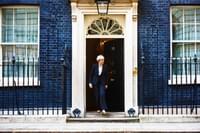
Winners and losers: a half-term assessment of May’s cabinet
As the fevered Party Conference season draws ever closer, Peter Divey looks in detail at the performance of key members of the Prime Minister's cabinet, determining who should be sacked and who should be promoted.
With the Tory party conference fast approaching, speculation can only increase regarding a possible challenge to the PM. The decision to call a snap election, and the subsequent result, colours everything. The tedious and clunky campaign alongside a peculiar manifesto bejewelled with social justice nuggets was just awful. It was not strong and became unstable. MP's who lost seats are being re-interviewed fuelling the pot of resentment. Many party members and MP's remain angry. With hindsight, it is seen as unnecessary gamble. Theresa May pulled in over 42 per cent of the vote, which ordinarily would have been commendable and has recently said that she will go "on and on". This has played to a mixed reception and seems only to have inflamed divides. But the charge to replace the PM is notable by its absence. Brexit is the big weight bearing down. The position is seen as a poisoned chalice rather than an opportunity. Now is not the time to be seen engaging in internecine party squabbling and certainly no one wishes to risk facing a weary electorate in a possibly losing general election. Careers could easily founder on those Brexit rocks. It is simple to follow the thinking: if Brexit is a success the Tory party overall can claim the glory, but if Brexit is a cock-up Theresa May can be the sacrificial lamb. Such is politics. Theresa May is probably secure as PM for now, even if the Party and Conference seethe with ambivalence. Just who would pick up that chalice?
What can Theresa May do to strengthen her position? A timely cabinet reshuffle is an often-used beneficial tactic. What would those half-term report cards say about the performance and credibility of her senior Ministers? Let's have a look.
1. Philip Hammond, Chancellor
The decision to ease up on deficit reduction because of "austerity fatigue" was an easy decision to make and appeals to a broad base. It is decidedly un-Conservative however and is a betrayal and burden to future generations. Plans to increase NI contributions for the self-employed stomped on a manifesto commitment and had to be hurriedly walked-back. Constant briefing in an effort to ensure a "softer" Brexit often appeared to contradict or even infuriate colleagues. During the PM's walking holiday Hammond seemed to believe he was de-facto PM such was his barrage of agenda-setting and he had to be firmly "put back into his box" by Downing Street. Unfortunately, talk of "cliff edges" and extended "transition" has gained traction and is now expected to be policy. In alliance with the "independent" Bank of England Governor Hammond appears to be continuing a minimised "Project Fear".
Grade: F
2. Amber Rudd, Home Secretary
Recognised as one of the most difficult jobs in Government many careers have stalled or crashed at this point. The PM will be fully aware of the difficulties. There seem to be weekly riots at HM' Prisons. Access to drugs or mobile phones appears unfettered. The tail seems often to be wagging the dog. Judges seem to think house-breaking and burglary is almost a non-event. The guilty, even with numerous prior convictions seem to be sent off to prune roses or pick litter so that they can attend drug rehab (and of course continue break-ins). Consequences do not match actions. The vast majority of British voters want immigration much more tightly controlled. In 2016 more than 500,000 new NI numbers were issued. Pressure on essential services will not ease anytime soon. "Efficiencies" sourced from private providers such as G4S have been anything but. Rudd has been left with a difficult task by her predecessor. The PM herself hardly pulled up any stumps when in this role.
Grade: D –
3. Boris Johnson, Foreign Secretary
This decision surprised me. Johnson is an exceptional attack-dog and provocateur but not from this role where his strength is emasculated. It is reported that other nations do not take Johnson seriously. Maybe it's different behind closed doors. In another situation, the PM could use Johnson like a scatter gun, wind him up, take aim, fire! Why turn down that option?
Grade: C +
4. David Davis, Brexit Secretary
The final result will tell, but he seems to be doing a good job. The EU constantly criticise the UK and Davis personally. He is getting under their skin. Good. Ultimately, he will do as instructed by the PM, but I do think Davis would distance himself from a poor deal that would undermine his standing. Davis has said that the UK will pay what it legally owes as well as a more nebulous "moral/political" component, but he wants to see what the UK will get in return first. He is fully aware that the "Brexit bill" is the crux of the matter on both sides and recently said that talk of the PM paying £50 billion was "nonsense". What price is the PM prepared to pay to ensure a good trade deal? I would say not a penny, but I expect it to be £10 billion as well as a further £30 billion over three years from 2019 during "transition". I hope Davis can persuade the PM to be less generous. I feel that "pay to trade" would reflect badly on the PM and this Tory government. The voters are watching.
Grade: A –
5. Michael Fallon, Defence
The announcement that Fallon will accept the recommendations of Sir John Parker regarding future shipbuilding is great news. At least five type 31e frigates will be ordered to herald in this new philosophy. Anything that provides competition to BAE Systems who have often bled the MOD dry can only be ace. The type 26 frigate, that announced as a cost of £500 million each, but are more likely to be £1 billion each because we have nowhere else to go. Not anymore hopefully. HMS Queen Elizabeth is on trials. Fallon needs to get as much as possible from a dreadfully constrained budget. Good start.
Grade: B
6. Jeremy Hunt, Health
Nothing is more important to the public than the NHS. If the Government gets this wrong they are finished. Winter crisis, social care collapse, long running disputes, strikes, budget black holes. It is the easiest thing in the world to knock the NHS. Hunt has a lot to do. The performance of the NHS defines a Government.
Grade: C
7. Justine Greening, Education
Standards are collapsing. Internationally the UK continually falls down the league table. One of the biggest problems is the endemic spread of political correctness, identity politics and social justice nonsense which is completely intolerant of other viewpoints. It is trickling down from so called higher education establishments into mainstream teaching at an ever-increasing pace. I think teachers should stick to facts rather than foisting opinions on students. It is expected that in the future all citizens will vote for Corbyn or his successors. Eventually, the whole system will become a "safe space", with teachers prioritising gender studies or "revised" history over traditional subjects. Deal with this and hope returns. Learning will replace indoctrination. There is a prospectus for Minister Greening.
Grade: D
8. Michael Gove, Environment
Needs to battle the Greenies not fawn before them. The cost of energy in the UK to individuals and industry is already uncompetitive, but it is heading towards debilitating due to levies and green subsidies that actually achieve very little. Banning all internal combustion engines by 2040 is a sop to vested interests. Gove will not have to personally implement this idea. A silly knee jerk reaction to Trump sensibly pulling out of the Paris Accords. Here and now Gove must fight the corner of UK fishermen. He must ensure that UK fishing waters are not bartered away chasing a Brexit deal. He has said some worrisome things already.
Grade: E
9. Priti Patel, International development
Foreign aid to you and me. The spend of 0.7 per cent of GDP is set in law. Austerity is the political watchword. Defence has been decimated. The NHS budget is so strained that rationing is common place. So our politicians decide to secure foreign aid spending so that they can feel and look good. It needs to be spent wisely. No sign of that happening.
Grade: F
The marks speak for themselves. I would replace Hammond, Johnson and Patel. Very few would wish to take Rudd's place so she would probably stay by default. I would find a role that allows Johnson to be much more useful to the party. It might be difficult to convince Johnson that any move is sideways and not a demotion. A slighted Johnson may choose to grab for the poisoned chalice which is something that the PM would want to avoid. Three MP's stand out as wastefully under-utilised and the promotion of any or especially all would greatly enhance the cabinet and governance. I would replace Hammond with Redwood , Johnson with Rees-Mogg and Patel with Paterson. It may be that all would refuse as any cabinet position just now has a touch of toxicity. Conference may reveal all.








